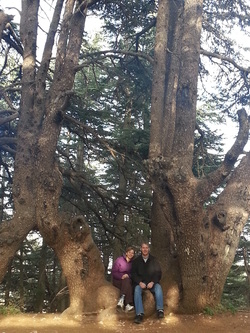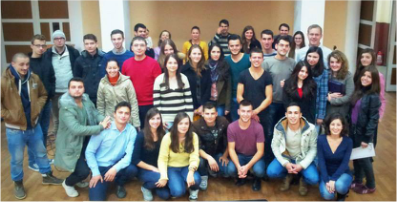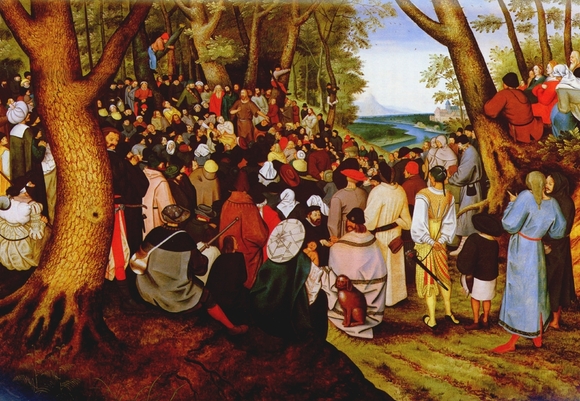 “So, did you guys, like, practice that part? The handoff?” I (Lisa) cringed as I listened to the reporter ask this question of one of the runners of the men’s 4 x 100 medley after their poor performance in the 2008 Olympics. It had been painful to watch. Nearly every handoff was badly botched, costing otherwise excellent runners crucial time. Their failure had been obvious, and someone needed to talk about it. But still, how insensitive can a reporter get? “Of COURSE they practiced it, you idiot!” I wanted to shout. “And they feel terrible about it right now.” My takeaway, as one who runs when I’m late for a plane and at almost no other time, was, “Wow. Handoffs must be really hard.” They involve an incredibly vulnerable moment to be handled with skill, trust, and confidence. Relay runners do in fact practice them, endlessly. The tricky thing in ministry is that these crucial moments come relatively rarely and we don’t practice or plan for them, so they catch us off-guard and all too often bring out the worst in us: fear, clinging to control, failure to honor the leadership that has gone before us and failure to endorse the leadership coming to replace us. I’ve participated in failure on both sides. So it is with fear and trembling that I reflect on a pattern I’ve observed again and again on our travels: the poorly executed handoff from older to younger national church leaders, and the costly stumbles as young, idealistic missionaries have handed off ministries to national leaders--sometimes far too hastily, sometimes releasing their grip far too slowly. I hope to make these comments with humility, prefacing them with the awareness that handoffs are hard the planet over, and that we probably did numerous things wrong that we remain blissfully unaware of as we handed off various student ministries over the years. That said, I do think some aspects of the lived experiences of Eastern European and Russian peoples have complicated the handoffs of church and parachurch leadership in particularly poignant ways. Two stories to illustrate: Senior Pastor Handoff Failures: One of the dynamics that complicates transitions to younger leadership in this part of the world is that the older generation of pastors suffered so, so much for the gospel. They did their very best with very few tools in their tool chests in terms of theological education or the training in psychology, church administration, and self-care that we hope is standard for pastoral preparation today. So when the next generation has had the opportunity to get some education, their new paradigms and theories can be quite threatening. We heard about a former dean share about a seminary/Bible college (many seminaries in developing countries are giving the equivalent of a bachelor’s degree in the states) he helped start, which graduated fifteen students one year. All had been sent there with the blessing of their churches; all were excommunicated for heresy or insubordination within one year of their graduation and entering leadership in their churches. We could clearly see the gentle, irenic spirit and theological chops of the dean who shared the story and had no reason to suspect him of anything close to heresy. We doubted that he taught these students to relate to their churches as upstarts and rebels. His sense, rather, was that they threatened the egos of the older pastors so much that they simply had to go. This college is no longer operating. How could it? It has no viable model in a small country if none of its graduates can find work. Missionary Handoff Failures: Here in Albania, over a late-evening meal, the pain on our new friend’s face was searing as he slowly articulated his response to Rich’s talk. Rich had taught on the ‘paradox promises’ of Mark, where Jesus promises real life, true security, and genuine greatness to those who will lose their lives, leave secure homes, and take the path of servanthood toward others. He thought it had gone well, and innocently asked what this man thought of the talk. He was prepared for at the least a polite, “It was fine.” Instead, our new friend wondered aloud what Rich had really experienced of suffering for these promises, and spoke at length of the pain in his life and the ways that he had risked so much for the gospel, given so much, in response to the extremely zealous young missionaries who first brought the gospel to Albania in the early nineties when it opened up as Communism collapsed. I won’t name the organization but they were youthful and they came with a strong sense of mission, bless their hearts. (Okay, a thin veiling there. I have utmost respect for this organization, by the way.) And let’s face it, fifty-year old Presbyterians who might have brought more texture, nuance, and wisdom just plain weren’t coming in droves to sleep on or under tables while they shared the gospel with anyone who would listen. (We actually met a 70-year-old who hosted a large team in her small apartment; they slept on every flat surface of her home and roof. She looks back on the time with great fondness.) But our friend took their idealistic words seriously and now wonders if he’d be better off financially and in other ways if perhaps he’d played it a bit safer. They came, they spread their wildly hopeful message, called young people here to risk it all, and then they left. The Albanians who remained were left to build churches with a paper-thin ecclesiology, and with models of leadership left over from the Communist era. It has not gone so well. The churches seem exceedingly prone to heading down odd doctrinal rabbit trails and to splitting over the slightest of infractions or differences. And some, like the friend who spoke so candidly to Rich that night, are still smarting as they try to flesh out what Jesus’ promises really mean in a land of scarcity and struggle. So, these are my questions as I consider how we as a global church might handle handoffs with more finesse: How can we better thank our elders for the suffering they endured and honor them for the legacy they leave us? How can we help them to release their grip gracefully? What will give them the confidence they need to entrust their ministries to the emerging generation of leaders, knowing full well that they are, “young and inexperienced,” as David described Solomon? How can we equip younger leaders with a greater understanding of organizational change dynamics and with the right mix of prophetic zeal and pastoral humility and patience so they can navigate the resistances they will face as they strive to bring change? How can we preach to equip congregations to grieve the past as it passes, welcome change even as it brings losses, and trust God through the uncertainties of transitions? Have you experienced a poorly executed handoff recently, or an excellent one? What made it so? What do you think are the factors that contributed to its success of failure? I’d love to hear your thoughts. If you read our blog as a prayer partner, we are at a Christian discipleship training center in a lovely, rather remote part of Albania for the next two weeks. Rich is teaching the book of Ephesians and I will teach some basics of public speaking for ministry. Please pray for these future leaders of Albania, and for our ability to connect with them quickly and genuinely enjoy them. This is our second-to-last stop before some down-time in December with family and friends. Our last stop is a third visit to a church in Romania to preach and invest in its leadership team. Pray that we finish 2014’s ministry tasks faithfully and well.
0 Comments
“You do not yet look so happy as I mean you to be.” Lucy said, “We’re so afraid of being sent away, Aslan. And you have sent us back into our own world so often.” “No fear of that,” said Aslan. “Have you not guessed?” Their hearts leaped and a wild hope rose within them. “There was a real railway accident,” said Aslan softly. “Your father and mother and all of you are—as you used to call it in the Shadow-Lands—dead. The term is over: the holidays have begun. The dream is ended: this is the morning.” And as He spoke He no longer looked to them like a lion; but the things that began to happen after that were so great and beautiful that I cannot write them. And for us this is the end of all the stories, and we can most truly say that they all lived happily ever after. But for them it was only the beginning of the real story. All their life in this world and all their adventures in Narnia had only been the cover and the title page: now at last they were beginning Chapter One of the Great Story, which no one on earth has read: which goes on for ever: in which every chapter is better than the one before. C . S . L E W I S , TH E L A S T B A T T L E I have been thinking (and teaching) about the eternal nature of friendship recently. After nearly four months on the road (including our one-month trip in July, and the three months since we left the US August 22), we continue to meet some amazing people, and often we form surprisingly strong affections after just a few days (or even just a few hours) together. We find ourselves leaving country after country sincerely hoping for an eventual return and a rekindling of the warmth of friendship we have only just begun to enjoy. Our understanding of the significance of friendship in God's kingdom and between his children leads us to keep our hearts open to these kinds of friendships, as we know that no act of friendship, regardless of how small or seemingly trivial, and no friendship itself, however brief, is wasted in God's economy, as he uses all things for the good of his children. Here are a few brief snapshots of some of these people we are very glad have entered our lives, however briefly.
We know little for certain about heaven, but Jesus did tell us two things. Marriage lasts until death, but no longer (Mark 12:25). Friendships, however, will continue in heaven.
ETERNAL FRIENDS (LUKE 16:1-9): The story Jesus told in Luke 16 troubles us as we read it. The good guy is cheated and the bad guy is commended! The manager, serving as an accountant for a wealthy landowner, was accused of wasting his employer’s goods, either through faulty accounting or poor decision making. He was fired and told to turn over the written records. It is as if he were told, “Have the records up-to-date and be ready to turn the books over to me by Friday.” So he decided to cook the books before turning them over to his master. He made friends by giving away his master’s money. In decreasing the amounts of rent people owed, he was making his master poorer and his master’s tenants wealthier. He hoped he could later turn these transactions into contacts and friendships he could literally take to the bank. His plan was that these clients would be indebted to him and would welcome him into their homes when he was turned out. It seems to be an encouragement of Machiavellian thinking or of outright dishonesty! The master was a shrewd businessperson himself. He had fired the manager because the manager was not shrewd in his dealings. So, in a moment of desperation, this inept manager developed a plan that was uncharacteristically shrewd. When the master discovered the plan, his own appreciation for shrewd thinking (even though at the same time he was dismayed about it) made him commend his former manager for this unexpected display of brilliance. At this point in the plot, the parable ended and Jesus spoke to the listeners: “Children of this age are more shrewd in dealing with their own generation than are the children of light” (Luke 16:8). To retranslate, "Businesspeople know how to use money to make friends, but Christians don’t.” And then Jesus went on to say perhaps the most confusing thing of all: “And I tell you, make friends for yourselves by means of dishonest wealth so that when it is gone, they may welcome you into the eternal homes” (verse 9). Let us consider what Jesus meant by a few of these phrases. First, “dishonest wealth” could also be translated “worldly wealth.” He was not speaking about wealth gained illegally. Jesus went on to contrast “worldly wealth” with true riches, that is, treasure in heaven (v. 11). Second, Jesus spoke about “when it [wealth] is gone” (v. 9). Wealth is gone when life itself is over, and that is when only treasure in heaven matters. For all people and all time, money always fails at the point of death. Finally, Jesus spoke of “eternal homes” (v. 9). Here Jesus was referring to heaven, where his disciples will live eternally with him and with one another. So what was Jesus trying to tell his disciples? Jesus told them to use money to make friends who would welcome them into heaven. Was Jesus actually telling people to buy friends? Missionary and martyr Jim Elliot wrote, “He is no fool who gives what he cannot keep to gain what he cannot lose.” Jesus appears to have agreed. Money one day will fail, but friendship, it seems, has the potential to be eternal. Jesus told his followers to invest their temporary, worldly wealth in other people who will become friends and welcome them into heaven. How does this happen? How do we make friends who will welcome us into heaven? We do this by spending our resources so that people will come to know our generous and wealthy God. As we spend our money on people, we communicate that they are valuable. The gospel says that God so loved people that he spent his only begotten Son on the cross in order to save them. God used his resources to make friends who would celebrate with him in heaven. Jesus, in this parable, was telling us to do the same. Is it appropriate to anticipate heaven for the company we’ll enjoy there? Our pursuit over, our quest achieved, what will fill our days? What society will we keep? Certainly we’ll drink deeply in fellowship with Jesus and bask in the glory of God. We’ll worship with the saints of history and the great men and women of faith of our own time. But it seems it is quite appropriate to seek to prepare for ourselves a company of eternal friends. We are told to order our affairs, set our priorities, even allocate our resources so that our eternal lives will be as friend-filled as our natural lives, if not more so. We are to live out our pursuit of God so that not only we but also those we care about find God as we do. Jesus’ words in Luke 16 tell us that no effort in friendship is wasted. In a society as transient as ours, it is easy to become cynical or complacent, settling for entertainment over intimacy and familiarity over risk. Nothing—no act of friendship, no friendship itself, however brief—is wasted on us, for whom “all things work together for good” (Romans 8:28). So we can love with abandon, knowing our love in faith will abide, even as our friendships change over time. So, faced with my frequent choice between making a phone call to a friend versus sinking into my solitary reading of a book or web article, I can be counseled by Jim Elliot. I cannot keep time—it slips through my fingers at an alarming rate of speed—but I can invest it so that I can gain wealth I cannot lose: deeper knowledge of God and friends committed with me to the enjoyment of God forever. I recently read through my college reunion directory. I looked for the name and address of my freshman roommate, fully knowing that I would not find it. I lived with Art for two years, and sometime after that, he became a follower of Jesus. Our friendship deepened in a dimension we had not shared during our years of living as roommates. After we graduated, he worked as an engineer (and soon as a manager) for Intel. I joined IVCF staff, and Art joined my support team. We toured Silicon Valley delis, lunching together every few months. This continued for a few years, until I received a phone call telling me of Art’s death from injuries sustained from a thousand-foot fall while ice-climbing Mount Shasta. That night was seventeen years ago. Art never knew my wife or children; I had heard he was recently engaged but never had a chance to meet his fiancée. Our friendship dates from a distant past, all but inaccessible to my life today. Yet this friendship is not inaccessible to my life a hundred years hence. Art will be one of the friends who will welcome me into the eternal homes. ... Imagine what it will be like when the faith is sight and the skies have been rolled back as a scroll. When we no longer see as through a glass darkly, what will we see? Among other things, the tremendous personal and eternal impact our lives and choices have made on so many, and the ripple effects from those lives similarly spent. C. S. Lewis told us (and by the final page of the Chronicles of Narnia we are ready to believe it) that our whole earthly lives are like the title page of the never-ending story of the people of God in the realm of God. We are, in this life, compiling the dramatis personae of our heavenly tale. So the pursuit of God in the company of friends ultimately turns into a celebration of God in the company of friends. Friends are with us not just for the journey but also for the party afterward. As we begin to suspect about many things in this life of faith, it is true also of friendship: the best really is yet to be.  As the Skype call with a wise friend neared its end and she asked how she could pray for me, I (Lisa) blurted out an answer that surprised me: “Pray for the ongoing challenge of being an outsider everywhere we go.” On one level, it’s not a new challenge. I’ve been an interim pastor for three churches in the past four years; in each place I was warmly welcomed and included in many ways, yet in each setting I was inevitably a guest, a stranger to the web of lived experiences that connected long-time members. I had to dive in as deep and as fast as I could, extending myself relationally while knowing that those relationships had meters on them that would run out before I might desire. The surprising grace in that endeavor was always the number of people who would open up to me with a level of trust I had not really earned. This year, we’ve ramped up the pace at which we dive in as outsiders into overdrive. We’re newcomers everywhere we go. Just when we’ve learned the bus systems enough to navigate a city reasonably well, or learned the basic phrases to make a transaction in a market, it’s time to go. We knew it would be true about our year, but I’m only now learning some of the ways our extreme and perpetual outsider status can be wearing, and some of the value of pressing into it. Choosing to position oneself as an outsider means signing up for a certain level of suffering and effort. But it’s a fascinating place to be. Jesus placed himself on the outside by wading into conversations with people from every level of society. Amos left Judah to preach to Israel, Jonah had a word for Nineveh that no Ninevite was about to deliver, and God had a strong word for him in that uncomfortable foreign land. Outsiders can see things that insiders can’t, though they miss many things as well. We have all sorts of observations about crazy driving here, for example. We’ve seen more cars zip through red lights in our week here than we might in years at home. But we don’t always see the underlying strength that it reflects, namely a creativity, agility and resilience in the face of street lights only intermittently working and roadways strained beyond their limits, in part by the influx of 1.5 million refugees since the start of the Syrian civil war. One pastor joked that they do not let foreigners preach in their church before making them drive the length of the capital city to be sure they have a strong faith! The remarkable thing about willingly entering the outsider zone is the way that the barriers can drop in an instant. One semi-thoughtful question from us and before we know it we’ve unwittingly picked a lock and slipped inside. Near strangers are sharing with us their dreams, their deepest frustrations with their country, their church, their ministry. This happened recently at a party we attended here. We’d had a lovely but full day seeing 2,000 year-old trees up in a mountain range outside the city with a couple who began the day as strangers and ended it as friends we hope to keep, albeit across the miles. The party wasn’t starting until 9pm, and we were tempted to beg off. But it was the spiritual anniversary of a young woman we were eager to meet, and it seemed rude to say no. We are trying to lean towards yes whenever we can in relationships these days. We arrived and immediately felt a strong wave of outsider status. The laughter was flowing and the conversation was loud, but alas, in Arabic. We tried to enter in, and they tried to shift to English at times, but understandably it quickly shifted back, and we sat munching our pizza in silence. Then along came a young woman whose English was impeccable and whose passion was apparent from the moment we met here. We’ll call her Miriam for now. As Miriam described her current work among Syrian refugees and poor citizens here, training them in small business skills and offering them micro-loans, we were impressed with her zeal. But then she described her ultimate dreams of impacting her country with a unique and inspiring vision, and we were blown away. I’ll let her tell that story in her Kickstarter campaign, but suffice it to say we both felt deeply blessed to be in her presence and hear her dreams. We hope to be able to play a small part in coaching her long-distance as she formulates her strategy, and if that happens, it will be a great privilege. We’d barely finished talking with her when we met another young woman who described the work she’s doing to lead multiple Bible studies, food distribution sites, and other programs among Syrian refugees here, and the joy it has given her and her whole church to welcome them. We left the party feeling richer than Midas in stories and inspiration, and so glad we’d pressed through our outsider discomfort. If you have a story of choosing to place yourself in a setting where you risked the discomfort of being an outsider and found it to yield good things in your life, I’d love to hear about it here. Please pray for us to continue to have the curiosity, perseverance, and humility to be gracious outsiders, and to seize and treasure the moments when we get to glimpse the inside of countries and hearts.  The countries we have been visiting were formerly under communist domination for decades, and the leadership legacy is stark and tragic. In a blog format, it is impossible to adequately nuance all the reasons for the leadership struggles in today's evangelical church scene in Eastern Europe and the former Soviet Union, but let me give you a few snapshots and make just a few simple reflections. First the snapshots:
This has hugely negative impact on Christian students coming to universities and on the ability of these national IFES movements to support themselves with local funding. It is difficult not to see this entire dysfunctional ecology as at least one significant indirect result of the oppressive presence of soviet-style government in the twentieth century, many negative impacts of which are still being felt here. Soviet-era suspicion toward churches specifically and alternative power structures in general left a leadership model that too-often become abusive, even from leaders who themselves have paid huge costs being oppressed by this system in the past, but now replicate it in more subtle ways in their churches. Please join us in praying for the believers here, that they grow in their trust of God and one another in their joint efforts to live as followers of Jesus and call others to do the same. Previous blog posts touching similar topics:  We are back in Romania and I am preparing for a talk on Situational Leadership at the University of Economical Science in Pitesti. I was just working with my host and friend Alex, to translate some simple slides for the presentation. The first slide, the title, was "Situational Leadership" which he translated to "Leadership Situational". I asked him about this, "leadership" didn't seem like a very Romanian word. He said, "No it is very common to use this word. We didn't really have a word for leadership. We had a word for boss, but not really a good word for leadership, so we have used this word." I see this as just another example of the leadership legacy of the soviet system, which certainly knew a lot about bosses and workers but was impoverishing of the economies, institutions, and the individuals within its corrupt and corrupting system. The Romanians have just recently gone to the polls, as people in the US will today, to elect new leadership for their governments. I do pray that real godly, servant leadership is found among those who are elected, for both countries are in need of true leaders today.  Update: Here's the photo that was posted to Facebook by one of the event organizers, Ana Ilie, who also translated for me and made it possible for me to have any ministry at all. There were about 40 people in the room, about 20 of which were people who were not familiar to the student group. We gave out a color-printed paper handout that included the graphic above, and we told people they could have an electronic version of the handout if they left their email on the response sheet. Almost everyone left their email address, and as a result, they were invited to the followup event the next evening where I spoke about the Leadership model of Jesus, looking at his teaching from John 10 about being the Good Shepherd, and looking at the contrast models in that passage of the stranger, the thief, and the hired hand. We talked about contemporary examples of good shepherds, as well as contemporary examples (not by name, but by description) of hired hands, thieves, and strangers. (For example, a "stranger" is a leader who tries to exert authority on the basis of some title or position he occupies, but he doesn't really know the people he is trying to lead. A "thief" is someone who is only in his or her leadership position to gain things for himself or herself, such as money, power, status, or some extrinsic reward of leadership, and has no genuine concern for the sheep. A "hired hand" is one who looks like a shepherd when things are going well, but who has no courage and flees in the face of danger.) About 30 people came to this more explicitly Jesus-focused event, including three new people from the night before. The organizers were pleased with the events, both the content and the turnout.  We’ve taught Scripture in some challenging settings and circumstances recently. If you’ve ever tried to have family devotions or lead a small group in a living room full of kids and dogs, you have too. I love the way the artist Pieter Breugel the Younger portrays the chaos John the Baptist may have faced with his motley crowd of soldiers and money-grubbing tax collectors. If you look closely you’ll see kids in a tree, a dog, a man working some sort of business deal in the foreground, and rollicking side conversations on the edges. Not what many preachers would call an ideal setting for the Word of God to be proclaimed. But what exactly are ideal circumstances for gathering around God’s word, anyway, and do they actually help? For example, one thing we suppose would help a sermon would be listeners who are quiet, and in a small group discussion, speakers who take turns. But quiet listeners can be asleep, and polite turn-takers utterly disengaged. Lately we’ve contended with chaotic settings, unexpected audiences, translation challenges, and illness. Be we’ve not lacked for lively learners and deeply satisfying experiences. Chaos: Rich led a Bible study on the Shrewd Manager for a group of doctors in Batumi, Georgia last week. (IFES ministries around the globe generally provide more ongoing discipleship support for their graduates than IVCF does in the US, for various reasons. The graduates in Batumi happen to be mostly doctors.) A cancer surgeon, a neurologist, a gastroenterologist and a dentist gathered with us and our host and translator, Tata, who capably leads the IFES movement in Georgia. She had warned us that distractions would abound. Buzzers and cell phones were most decidedly not switched off for the study. One after another would head out to the balcony to discuss a critical patient case, field a babysitting snafu back home, or take a call from mom. One came half an hour late and was utterly confused. Some were reading from the Bible in Georgian, one preferred Russian, and one wanted to use an English version he had, and got tripped up by a translation issue at a key point in the passage. All were from an Orthodox background and had many questions about side and central issues of the faith that they wanted to sneak in to an already difficult passage. The passage initially upset them immensely—something Rich loves when he leads that study. Normally I enjoy watching the tension grow in a room as he accentuates the sheer deviousness of the manager and the seemingly incomprehensible praise he gets for it from his master and then from Jesus. But this time I had visions of the time my mom’s pressure cooker exploded all over the kitchen when I was a child. Is it all about to blow? For a long stretch Tata stopped translating so she could let their heated comments flow freely. Finally, some clarity came, and they thanked Rich exuberantly but then dashed off to more urgent pursuits. What the heck just happened? Did anything sink in? The text messages to Tata the next day indicated that they had appreciated the time very much, but it was all just so chaotic it was hard to tell what landed, as if he’d scattered seeds during a windstorm. Sometimes the only day you get for sowing, there’s a windstorm. Conditions aren’t ideal. Hope says to sow anyway. Tummy Troubles: Overall I’ve been pleased with and grateful for our good health so far on this journey. But the whiplash of going from sunny Batumi to snowy (and beautiful) Veluko Turnovo, Bulgaria, messed me up. It may have been the water. In general we don’t worry about water too much in the places we’ve visited, but since slight variations in even good water can cause a reaction, when we think to we drink bottled for the first day or two. I did not do that there. Or, it may have been the meat. Our vegetarianism is on hold for the year, since the diets here are so meat-based that it would be hard to get protein if we turned it all away. But Bulgaria might just take the prize, with its hot dogs and cold cuts at breakfast, chicken stew at lunch, and stuffed beef patties at dinner. For whatever reason, I had a violently upset stomach for most of Saturday, and truly wondered if I could or should give the talk I was scheduled to give that evening. Somehow I sensed God was in it and wanted me summon all the energy I could muster and go for it. I preached on forgiveness from the life of Joseph, focusing on the words of blessing, validation, and perspective that Jacob gives to Joseph in the final days of his life. Jacob’s grandiose gift of a lavish coat arguably set the whole mess in motion; as his life ends all he has left to give Joseph are words, but they are powerful. I believe they propelled Joseph across the finish line to full forgiveness. I am particularly struck by the line, “He was set apart from his brothers.” (Gen. 49:26) Joseph has been fixated on the injustice of being separated from his brothers; Jacob reframes it as being set apart by God from them, for God’s good purposes. I challenged students to seek God’s bigger purposes when they are stuck relationally and to give the gift of perspective to others who are stuck. I know how much I benefit from friends who lift my head and help me see the bigger picture. The students seemed solidly engaged as I spoke, and I heard that my words encouraged several people to seek needed reconciliation in their friendships. And my tummy survived. It wasn’t ideal, but I’m glad I went for it. Mixed Audiences: In my homiletics classes we talk a lot about the challenges and the goodness of preaching to a diverse audience. It stretches us as preachers and it keeps us on our toes. I preach with more energy and humor when I know the teens will not be dismissed to do their own thing but will be in the room. I preach with more sensitivity to how a given word will land when I know that listeners will be present who have endured great tragedies or persistent forms of racism, economic hardship, etc. But there is a certain ease and expectation that we rest on when we think we know who will be present. I thought I knew roughly who would be there when a pastor in Georgia asked me to give a seminar on preaching. I had been asked for a similar seminar in Belarus, and the gathering had consisted of the staff of a church, including three sharp interns pursuing doctorates in music, historiography, etc. The concept of a sermon needing to unfold like the score of a symphony or the plot of a novel found immediate uptake and we were off to the races, discussing narrative arcs, tension and resolution, and inductive vs. deductive strategies. So in searching for a category in which to place the pastor’s request, I committed the fallacy of assuming that the present would be something like the past. It was clear the moment I walked in the door to the church in Georgia that this gathered group was ever so slightly different. A knot of elderly men, current and retired pastors, unfolded to greet me; a group of teenaged girls smiled their hellos. Suddenly it dawned on me that this gathering was something more like a midweek service, and I was something more like the preacher. “Pastor, do you have your Bible?” the pastor gently asked me, looking slightly worried. My Bible this year is on my Kindle only; it was charging back where we were staying. I had a brief wave of imposter feelings—what kind of preacher doesn’t come with a Bible? I gratefully selected a large, leather-bound English Bible from his study. I quickly realized that what I needed to do was not so much teach on preaching as preach good news to faithful servants who proclaim the gospel in all sorts of way throughout their weeks. I pondered the fact that some of these older men, who might not know a deductive point from an inductive one, had preached through communism, for goodness sake, while I was fussing about a prom date or a bad hair day. And yet they were coming to hear from me? I glanced down at my page of jumbled notes on inductive strategies, crossed a bunch of things out, and scribbled down six phrases:
 The artist Grunewald captures John’s calling to be a finger pointing to Christ so well here. What a privilege, under any circumstances. What are the circumstances with which you contend as you try to speak good news these days? Hopefully they aren’t utterly ideal in the sense of smooth and seamless—that seems less conducive to dynamic encounters. I hope you’ll press through the challenges and look for the surprising work of God in unlikely situations. Blessings on you as you point to Jesus this week. (This reflection on John the Baptist captures what I love about him in words more eloquent than mine: http://heroesfoundfaithful.blogspot.ro/2010/12/john-baptist.html.) As you pray for us in the coming days: Rich is speaking tonight on Situational Leadership for a secular audience at a university tonight here in Romania. Thursday we head to the fall conference of the Romanian campus fellowship, where we will both teach on various topics, from mentoring to women in leadership. Please, as always, pray for health, resilience with the challenges of travel, and hearts of love for those we meet. |
Archives
April 2024
AuthorRich and Lisa Lamb Categories |
 RSS Feed
RSS Feed